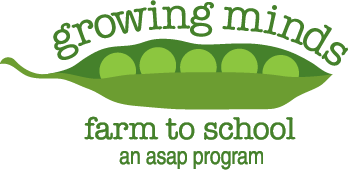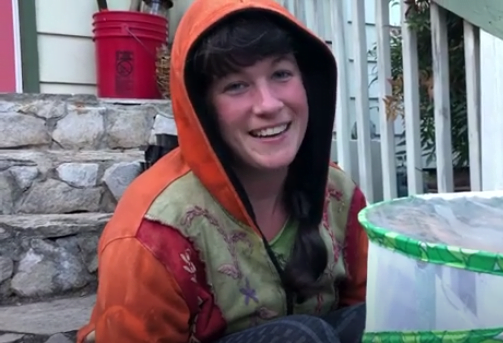For our February 2021 Farm to School Educator Spotlight, we’re featuring the work of Jordan Diamond, the FEAST Program and Garden Coordinator at Lucy S. Herring Elementary School (formerly Vance) in Asheville. Jordan received a Growing Minds mini-grant last fall, which she used to purchase equipment to help transition her lessons to the virtual learning environment. In the interview below, she shares some of the creative ways she’s been keeping her students engaged in farm to school learning throughout the pandemic. Be sure to check out the links to her video series!
How long has your school had a garden? What do you grow? How do you incorporate the garden into your school’s activities or curriculum?
The Lucy S. Herring Elementary School Peace Garden was first created by a group of parents, teachers and students in 1997 and continues to grow with all of the hard work and love of this dedicated community. We care for and enjoy eating a variety of perennial fruits as well as seasonal vegetables, herbs, and a pollinator garden.
The Peace Garden is the cornerstone of the school’s magnet theme of Ecology. Through a partnership with Bountiful Cities, students receive regular gardening and cooking lessons that are a collaboration between the FEAST Garden Coordinator and classroom teachers. FEAST lessons integrate all subject areas to create a hands-on and real-life extension of the school curriculum. Teachers also develop projects and lessons that incorporate the garden into their curriculum.
In what ways have you continued to use the garden and/or teach your students about local food and farms during COVID?
This fall, I took each class on a Virtual Garden Tour to show them what was growing in the garden, engaging students with guessing and observation games. Then, I began recording educational videos to share with classroom teachers, who then showed them to students during synchronous meetings.
The first series of videos focused on the life cycle and migration of Monarch butterflies that I raised from caterpillars found on our milkweed. The second and current series of videos focuses on cooking recipes featuring a different vegetable each week. The recipe and videos are also shared with families, so students can make the recipe at home. All videos are available to the public on the FEAST Peace Garden YouTube Channel and were made possible by a grant from the ASAP Growing Minds program.
The garden itself has shifted into a hub for growing and sharing produce with the community, families, and school staff. Once a week, I put out produce from the garden and produce donated by Mother Earth Food and Manna Food Bank on a Produce Sharing Table. We have also been hosting small, masked and socially distanced garden workdays to keep the garden maintained and tackle bigger projects.
How do you keep your students engaged in the garden/farm to school activities during winter?
During a typical school year, FEAST lessons focus on cooking. Each grade plants a crop in the spring that they will harvest in the fall and then cook in the winter. We use row covers to extend the growing season so we can continue to harvest through the winter for our cooking lessons. Beginning in January, students learn about garden planning and help start seeds for the summer garden.
Tell us about a favorite story or experience from your school’s garden.
One day during an after school class, a first grader came running up to me with his pockets bulging. With a mouthful of kale, he said, “Guess what, Ms. Jordan! I have a radish in my pocket!” and then skipped around the garden singing about the radish in his pocket. It brings me so much joy to watch the kids find so much pleasure in picking food off a plant or from the ground. They make the simplest things exciting and magical.
What tips or advice would you offer to others who would like to start a garden at their school?
Start small and make sure that there is a committee of parents, school staff, and community members who will support the garden, with one person committed to the role of chairperson or garden coordinator (who is not also a classroom teacher). Develop a good relationship with the grounds maintenance crew and school administration. Give students and teachers opportunities to develop ownership as much as possible.
—
Jordan Diamond coordinates the FEAST program and Peace Garden at Lucy S. Herring Elementary School. FEAST is a program of Bountiful Cities, a local nonprofit that promotes food sovereignty and education in Buncombe County.

